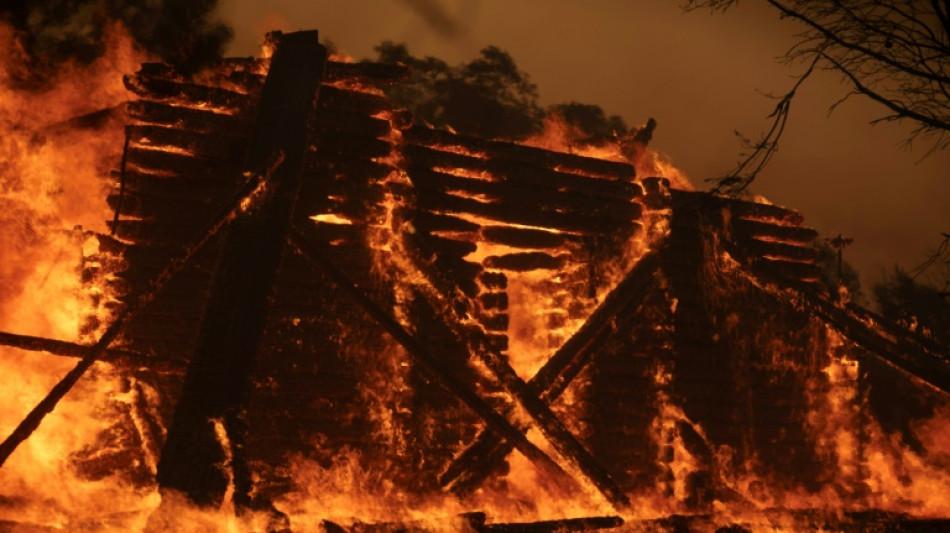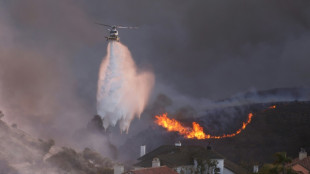

Greece wildfires force hundreds to evacuate
Greece on Sunday was battling a spate of wildfires which have forced the evacuation of hundreds of people, as experts warn of more extreme weather conditions to come next week.
Firefighters were battling a "dangerous" fire near Athens on Sunday night, with smoke covering parts of the capital in a haze.
By Sunday afternoon, firefighters had quickly dealt with 33 out of the 40 blazes that had broken out in the past 24 hours, fire brigade spokesman Vassilis Vathrakogiannis told the press at an emergency briefing.
But the force was battling seven more in the high Mediterranean summer heat, he said.
The country's minister for civil protection had warned a day earlier that half the country was under a high-risk warning for fires due to high temperatures, wind gusts and drought conditions.
In the region of East Attica, an uncontrolled blaze in the Varnavas area which spread to a pine forested zone with scattered houses, emitting so much smoke that Athens glowed red at one point, was still raging Sunday night.
Hundreds of people evacuated from at least eight nearby villages, while some were battling to save their houses from the fire by attempting to douse the flames.
"The situation remains dangerous given the fact the fire is raging in an area with houses and has provoked damages," Vathrakogiannis said.
"The strong winds spread it in a flash, creating extreme behaviour, with new fronts behind the containment lines," he added.
- Flames 25 metres high -
A force of more than 400 firefighters backed by 110 vehicles, 29 firefighting aircraft and helicopters was deployed to battle the flames, which "in many cases reached more than 25 metres high", Vathrakogiannis said.
Firefighters and forest commandos were expected to continue the battle all night long.
"Every year we have to escape from our houses," she said speaking from the saddle of her motorbike fresh from checking up on her cats.
The fire brigade spokesman stressed that many trapped civilians were rescued because they refused to leave their homes despite the evacuation messages they received.
Giorgos Tsevas, 48, from Polydendri, a village near the fire front that in Greek means "many trees", was desperate: "Everything is burning. I have 200 olive trees there but now they are gone."
Another fire that erupted earlier on Sunday afternoon in Megara, West Attica, triggering an evacuation alert, was partially contained after destroying at least three houses and cars.
Forty-eight firefighters equipped with 13 vehicles and additional volunteers were working on the ground, along with aerial support.
In Thessaloniki, a fire in the Lagadas area was partially under control, with 20 firefighters, 10 vehicles and one helicopter at the scene.
- Extremely high temperatures -
Temperatures are forecast to peak at 39 degrees Celsius (102 degrees Fahrenheit) in Greece on Monday, with the highest temperatures expected in the west of the country.
With winds in some areas predicted to reach 80 to 90 kilometres per hour, Kostas Lagouvardos, director of research at the National Observatory of Athens, told broadcaster ERT News that Sunday was expected to be the most difficult day to battle fires.
The Mediterranean country is exceptionally vulnerable to summer blazes, with this season seeing fires burn daily.
After the warmest winter on record, Greece also experienced its hottest June and July since reliable data collection began in 1960.
It registered its earliest recorded heatwave in June.
Scientists warn that human-induced fossil fuel emissions are worsening the length, frequency and intensity of heatwaves across the world.
The rising temperatures are leading to longer wildfire seasons and increasing the area burnt in the flames, according to the United Nations Intergovernmental Panel on Climate Change.
S.Boyle--IP




